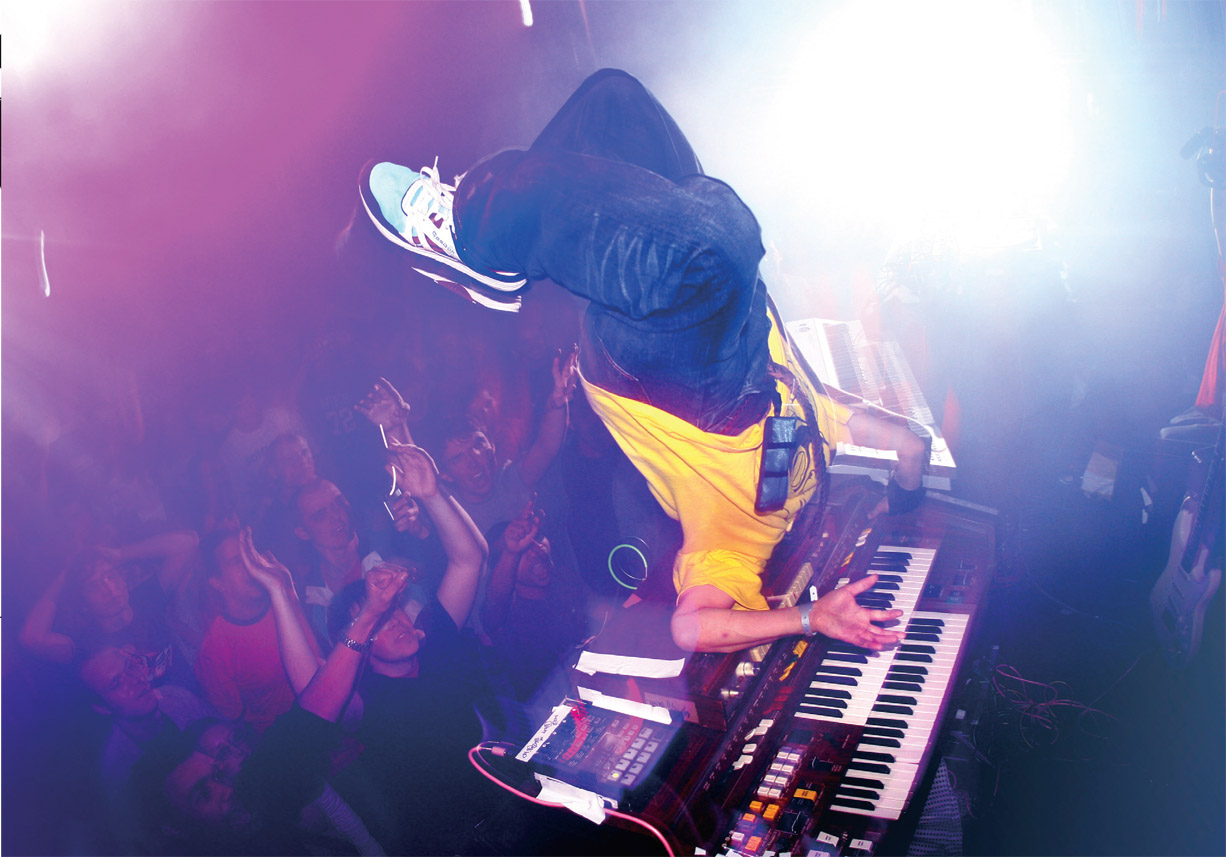Electronic organs have been part of the Japanese DJ’s toolbox for more than decade, but it took YouTube to make Electone artistry an American sensation. When video clips of the hyperactive DJ Tucker lighting a fire (literally) on a Yamaha Electone electronic organ (while standing upside down) began making the rounds on YouTube in the spring of 2006, a phenomenon was born. The intensity of Tucker’s performance — and the crowd’s mounting energy — reinvented this usually staid instrument.
Tucker’s confounding, high-energy mix of rock and roll, punk, pop, and hip hop leaves critics fumbling for words. The electric organ fan site Electone Zone described it dizzily as “a 21st century Neo-Tokyo vaudeville show.” Other fans describe his sets as “performance art” (in 2006, Tucker appeared at Barcelona’s Sónar multimedia music and art festival).
“Vaudeville” implies comedy, and laughter is the obvious response when Tucker spins the “Pink Panther” and “Sesame Street” theme songs, scratches records with his nose, or leaps shirtless into the crowd. Music critics’ vocabulary is rarely so taxed, but coming up with a way to describe someone not entirely hip hop, not entirely rock, not entirely retro, and perhaps not ever entirely serious has left many at a loss. Even Tucker’s show-stopping blazing organ trick is both a Hendrix send-up and a gutsy act of vandalism more punk than hip hop. Tucker’s mash-ups are knowing and often more than a little tongue-in-cheek, but his reverence for retro instruments and melodies goes well beyond the merely ironic.
“I started using organ and turntable around 2004,” he says, “which is about the same time I started my solo concert. At first, I was playing at cafes, but after I played at my friends’ punk band events, I started my original playing style — playing electronic organ by standing on my hands on a keyboard or setting fire to the rhythm box as performance. Usually, I perform for many different kinds of shows, such as hip hop, house, techno, hardcore punk, garage, and noise.”
In 1998, Tucker released his single, “The Man from Electone,” while touring the United States as the keyboardist for Natural Calamity. The following year brought him back to the US as keyboardist for Jackie & The Cedrics. Tucker’s first album, Tucker is Coming, was released in 2003 with Japan’s OddJob Records, the same year that he played at the Fuji Rock Festival. In 2005, he released “Electoon Wizard” featuring DJ Ken-One, with whom Tucker battles in another YouTube must-see clip.
On stage, Tucker flings his slim body tirelessly between the electric guitar, bass, drums, and turntables, but it’s the Electone that garners the most attention. (The Electone trademark is used for Yamaha’s Asia-only line of electronic organs.) Tucker’s preferred instrument is a fully programmable digital synthesizer that can mimic a full orchestra but whose outward appearance still hearkens to the homely domestic instrument that appeared in Japanese homes in 1959.
Tucker recalls, “About 10 years ago I heard my mom was playing electric organ. She was playing enka, Japanese traditional songs, and it sounded fresh and cool to me. I started playing [the electric organ], which was different from a Hammond organ. I realized that the sound was cheap and strange but very interesting. I used to play guitar, but I thought electric organ had more possibility, and that I would be able to show my originality more with electric organ. I also started using electric organs because they’re not valuable instruments, so I could get one for free. I thought it would be meaningful to make the instrument interesting and valuable through my own efforts, rather than something that others have already explored.”
Tucker’s well-trafficked MySpace page proclaims, “Tucker combines Electone, synth, scratching, and literally BLAZING theatrics to create crowd pleasing performances that dispel any belief that Electone isn’t cool.”
The Electone’s reputation as cheap and uncool — a mom instrument — also gives it the ultimate hipster cache. Today there’s a thriving underground of Japanese Electone enthusiasts giving birth to fan sites like Electone Zone and trading YouTube links to videos of Japanese schoolchildren rocking the Electone — everything from “It’s a Small World” to Kansas‘ “Carry On My Wayward Son.”
The Yamaha corporation also fosters the community by sponsoring junior competitions such as Electone Stage 2007, the Yamaha Electone Festival, and biggest of all, the Junior Original Concert (or JOC). The JOC, established in Japan in 1972, showcases the work of children who have participated in the international Yamaha Music Education System, and in recent years has featured some daring original compositions — though nothing as daring as setting their organs on fire.

